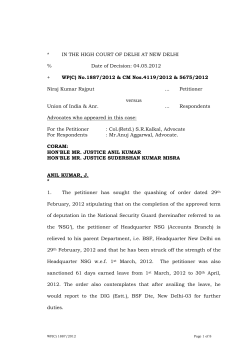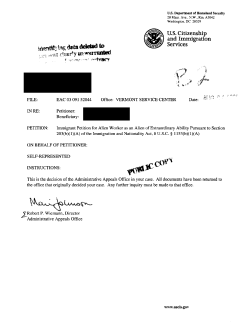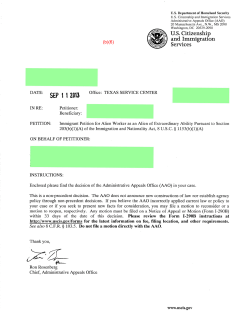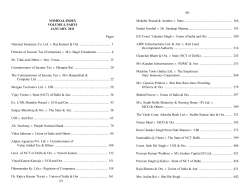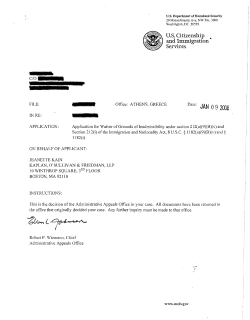
Document 1216
identifying data deleted to prevent clearly unwarr~ted invasion of personal pnvac} PUBLlCCOPY U.S. Department of Homeland Security U.S. Citizenship and Immigration Services OJ/Ice of Administrative Appeals. MS 2090 Washington, DC 20529-2090 u.s. Citizenship and Immigration Services Office: TEXAS SERVICE CENTER rILE: Date: DEC 2 0 2010 IN RE: Petitioner: Beneficiary: PETITION: Immigrant Petition for Alien Worker as a Member of the Professions Holding an Advanced Degree or an Alien of Exceptional Ability Pursuant to Section 203(b)(2) of the Immigration and Nationality Act, 8 U.s.c. § IIS3(b)(2) ON BEHALF OF PETITIONER: INSTRUCTIONS: Enclosed please find the decision of the Administrative Appeals Office in your case. All of the documents related to this matter have been returned to the office that originally decided your case. Please be advised that any further inquiry that you might have concerning your case must be made to that office. Thank you, ,/perry Rhew Chief, Administrative Appeals Office www.uscis.gov DISCUSSION: The Director, Texas Service Center, denied the employment-based immigrant visa petition, which is now before the Administrative Appeals Office (AAO) on appeal. The appeal will be sustained and the petition will be approved. The petitioner seeks classitication pursuant to section 203(b)(2) of the Immigration and Nationality Act (the Act), 8 U.S.c. § 1153(b)(2), as a member of the professions holding an advanced degree. The petitioner seeks employment as a researcher. The petitioner asserts that an exemption from the requirement of a job offer, and thus of an alien employment certification, is in the national interest of the United States. The director found that the petitioner qualifies for classification as a member of the professions holding an advanced degree but that the petitioner had not established that an exemption trom the requirement of a job offer would be in the national interest of the United States. On appeal, counsel submits a brief and additional evidence. While not all of counsel's assertions are persuasive, we are persuaded that the petitioner has overcome the director's bases for denial. Section 203(b) of the Act states in pertinent part that: (2) Aliens Who Are Members of the Professions Holding Advanced Degrees or Aliens of Exceptional Ability. -(A) In General. -- Visas shall be made available ... to qualified immigrants who are members of the professions holding advanced degrees or their equivalent or who because of their exceptional ability in the sciences, arts, or business, will substantially benefit prospectively the national economy, cultural or educational interests, or welfare of the United States, and whose services in the sciences, arts, professions, or business arc sought by an employer in the United States. (B) Waiver of Job Ofrer. (i) ... the Attorney General may, when the Attorney General deems it to be in the national interest, waive the requirement of subparagraph (A) that an alien's services in the sciences, arts, professions, or business be sought by an employer in the United States. The petitioner holds a Ph.D. in Chemistry from the State University of New York (SUNY), Syracuse. The petitioner's occupation falls within the pertinent regulatory definition of a profession. The petitioner thus qualifies as a member of the professions holding an advanced degree. The remaining issue is whether the petitioner has established that a waiver of the job offer requirement, and thus an alien employment certification, is in the national interest. Neither the statute nor pertinent regulations define the term "national interest." Additionally, Congress did not provide a specific detinition of "in the national interest." The Committee on the Judiciary merely noted in its report to the Senate that the committee had "focused on national interest by increasing the number and proportion of visas for immigrants who would benefit the United States economically and otherwise .... " S. Rep. No. 55, IOlst Cong., 1st Sess., II (1989). A supplementary notice regarding the regulations implementing the Immigration Act of 1990 (lMMACT), published at 56 Fed. Reg. 60897, 60900 (Nov. 29, 1991), states, in pertinent part: The Service believes it appropriate to leave the application of this test as flexible as possible, although clearly an alien seeking to meet the [national interest] standard must make a showing significantly above that necessary to prove the "prospective national benefit" [required of aliens seeking to qualifY as "exceptional."] The burden will rest with the alien to establish that exemption from, or waiver of, the job offer will be in the national interest. Each case is to be judged on its own merits. Maller of New York State Dep't oj Tran.lp., 22 I&N Dec. 215, 217-18 (Comm'r. 1998) (hereinafter "NYSDOT"), has set forth several factors which must be considered when evaluating a request for a national interest waiver. First, the petitioner must show that the alien seeks employment in an area of substantial intrinsic merit. Id. at 217. Next, the petitioner must show that the proposed benefit will be national in scope. Jd. Finally, the petitioner seeking the waiver must establish that the alien will serve the national interest to a substantially greater degree than would an available U.S. worker having the same minimum qualifications. Id at 217-18. It must be noted that, while the national interest waiver hinges on prospective national benefit, the petitioner must establish that the alien's past record justifies projections offuture benefit to the national interest. ld. at 219. The petitioner's subjective assurance that the alien will, in the future, serve the national interest cannot suffice to establish prospective national benefit. The inclusion of the term "prospective" is used here to require future contributions by the alien, rather than to facilitate the entry of an alien with no demonstrable prior achievements, and whose benefit to the national interest would thus be entirely speculative. Jd. We concur with the director that the petitioner works in an area of intrinsic merit, microbial research. and that the proposed benefits of his work, improved antibiotic therapies, would be national in scope. It remains, then, to determine whether the petitioner will benefit the national interest to a greater extent than an available U.S. worker with the same minimum qualifications. Eligibility for the waiver must rest with the alien's own qualifications rather than with the position sought. In other words, we generally do not accept the argument that a given project is so important that any alien qualified to work on this project must also qualifY for a national interest waiver. NYSDOT, 22 I&N Dec. at 218. Moreover, it cannot suffice to state that the alien possesses useful skills, or a "unique background." Special or unusual knowledge or training does not inherently meet the national interest threshold. The issue of whether similarly-trained workers are available in the United States is an issue under the jurisdiction of the Department of Labor. Jd. at 22 I. Page 4 At issue is whether this petitioner's contributions in the field are of such unusual significance that the petitioner merits the special benefit of a national interest waiver, over and above the visa classification he seeks. By seeking an extra benefit, the petitioner assumes an extra burden of proof. A petitioner must demonstrate a past history of achievement with some degree of influence on the tield as a whole. Id. at 219, n. 6. In evaluating the petitioner's achievements, we note that original innovation, such as demonstrated by a patent, is insufficient by itself. Whether the specific innovation serves the national interest must be decided on a case-by-case basis. Id at 221, n. 7. The petitioner submitted eight articles and four abstracts. While the petitioner's publications demonstrate that his work has been disseminated in the field, at issue is the influence of these articles. The petitioner initially submitted the citation results for five of his articles, two of which show moderate citation. The petitioner also submitted copies of the citing articles. While some of the articles merely cited the petitioner's work as one of multiple studies in a particular area, other citations For and in a 2008 article In cites the petitioner's 2007 as a controversy. In another article published in s work at lenh>th and asserts that the petitioner's 2007 article substantiated a suspicion in the field. On appeal. the petitioner submits the citation results for seven articles published prior to the date of tiling and for an article published in the Proceedings of the National Academy ojSciences (PNAS) after the date of filing. These results reflect higher citation levels than previously documented, even as of the date of tiling. Counsel cites unpublished decisions by the AAO, one as an example where the AAO sustained an appeal in a case involving fewer citations and a second decision for the proposition that citations after the date of filing are relevant evidence. While 8 C.F.R. § 103.3(c) provides that AAO precedent decisions are binding on all USClS employees in the administration of the Act, unpublished decisions are not similarly binding. Every case is decided on its own facts. We will not set a benchmark number of citations that is decisive in all fields irrespective of the other evidence of record. Thus, the fact that the AAO has sustained an appeal for an alien seeking the same benetit but who had few citations is not determinative. Moreover, the petItIOner must demonstrate his eligibility as of the tiling date. See 8 C.F.R. §§ 103.2(b)(l), (12); Maller ojKatighak, 14 I&N Dec. 45, 49 (Reg'!. Comm'r. 1971). In this matter, that means that he must demonstrate his track record of success with some degree of influence on the tield as a whole as of that date. All of the case law on this issue focuses on the policy of preventing petitioners from securing a priority date in the hope that they will subsequently be able to demonstrate eligibility. Maller of Wing 's Tea House, 16 I&N Dec. 158, 160 (Reg'!. Comm'r. 1977); Mafler oj" Kafighak, 14 I&N Dec. at 49; see also Maller oj" Izummi, 22 I&N Dec. 169, 175-76 (Comm'r. 1998) (citing Maller oj"Bardouille, 18 I&N Dec. 114 (BIA 1981) for the proposition that we cannot "consider facts that come into being only subsequent to the tiling of a petition.") Page 5 Consistent with these decisions, a petitioner cannot secure a priority date in the hope that his recent research will subsequently prove influential. Ultimately, in order to be meritorious in fact, a petition must meet the statutory and regulatory requirements for approval as of the date it was filed. Ogundipe v. Mukasey, 541 F.3d 257, 261 (4 th Cir. 2008). Nevertheless, citations after the date of filing can be noted as continuing a trend of significant citations that was already apparent as of the date of filing. In this matter, as demonstrated on appeal, the petitioner had already secured a number of citations as of the time of filing, a trend that has continued since that time. Moreover, as stated above, some of the citations predating the filing of the petition go beyond citing the petitioner's work as one of several studies in the same area. associate professor at the University of Maryland School of Medicine, discusses the petitioner's work at that institution. Specifically, the petitioner is investigating the structure and function of human a-defensins, natural antimicrobial proteins._ explains that defensins are ideal candidates for novel antibiotic therapies because they do not induce resistance. _ further explains that the project is complicated by an inability to secure sufficient protein material from natural sources. _states: [The petitioner] used a newly developed method and chemically synthesized defensins in large quantity and in high purity. This achievement has never been achieved before by his peers. This breakthrough is extremely important because this makes possible for future defensin research to develop at an unprecedented pace. As further evidence of his creativity, [the petitioner] designed his novel analytical methods using surface plasmon resonance and fluorescence to characterize the structure and function of defensins, which is a critical step for solving issues concerning the underlying molecular mechanism. Next,_discusses the petitioner'S work with cancer therapeutics. Specifically, _explains that the petitioner focused on regulation of the tumor suppressor protein p53, implicated in 50 percent of tumors._ continues: [The petitioner] managed to micro-dissect the key structure and function elements required for the protein therapeutics to regulate p 53, and implemented these elements in a designed mini-protein, namely stoppin. The effectiveness of this mini protein therapeutics has been proved by biophysical and cell-biological experiments. _ then discusses a separate cancer research project in which the petitioner "solved a long time mystery of the correct folding of somatomedin B (SMB) domain of vitronectin, which plays a central role in regulating tumor metastasis." _ notes that this issue "has been debated since 5MB was discovered in 1996."~ discussion of this work in his own article supports_ assertion. The petitioner also submitted five letters from independent researchers, including g. While. _only generally asserts that he has "certainly beneiited from reading and using" the petitioner's data. his lengthy discussions of the petitioner's work in his own articles is noteworthy. an assistant professor at the Mount Sinai School of Medicine, provides considerable detail about the petitioner's impact on her own work. Specifically,_ explains that synthesizing defensins is difficult work, resulting in commercially available defensins that are both continues: expensive and of poor quality. _ However, in one of my lab's projects investigating anti-HIV -1 activity of defensins and the mechanism of this activity, we chose to use a set of alpha defensins synthesized by [the petitioner]. Due to the quantity and quality of [the petitioner's] defensins, we had a big breakthrough and achieved very exciting and promising results. Specifically, we found that these defensins had a dual role in antiviral deiense, acting directly on the virion and on the host cell. The findings have great implications for prevention and treatment of HIV /AIDS. _ explains that she has published her research and continues to pursue further results under a grant from the National Institutes of Health (NIH). The Board of Immigration Appeals (the Board) has held that testimony should not be disregarded simply because it is "self-serving." See, e.g., Maller of S-A-, 22 I&N Dec. 1328, 1332 (BIA 2000) (citing cases). The Board also held, however: "We not only encourage, but require the introduction of corroborative testimonial and documentary evidence, where available." Jd. If testimonial evidence lacks specificity, detail, or credibility, there is a greater need for the petitioner to submit corroborative evidence. Maller ofY-B-, 21 I&N Dec. 1136 (BIA 1998). The opinions of experts in the field are not without weight and have been considered above. USCIS may, in its discretion, use as advisory opinions statements submitted as expert testimony. See Matter of Caron International, 19 r&N Dec. 791, 795 (Comm'r. 1988). However, USCIS is ultimately responsible for making the final determination regarding an alien's eligibility for the benefit sought. Id. The submission of letters from experts supporting the petition is not presumptive evidence of eligibility; uscrs may, as we have done above, evaluate the content of those letters as to whether they support the alien's eligibility. See id. at 795; see also Maller of V-K-, 24 I&N Dec. 500, n.2 (BIA 2008) (noting that expert opinion testimony does not purport to be evidence as to "fact"). uscrs may even give less weight to an opinion that is not corroborated, in accord with other information or is in any way questionable. Id. at 795; see also Maller of Soffici, 22 I&N Dec. 158, 165 (Comm'r. 1998) (citing Maller of Treasure Craft of Califbrnia, 14 I&N Dec. 190 (Reg'1. Comm'r. 1972)). Merely repeating the legal standard for the benefit sought does not satisfY the petitioner's burden of proof. 1 The letters considered above, however, provide specific examples of independent researchers relying on the petitioner's work. The petitioner also submitted corroborating evidence in existence prior to the preparation of the petition that bolsters the weight of the reference letters. It does not appear to have been the intent of Congress to grant national interest waivers on the basis of the overall importance of a given field of research, rather than on the merits of the individual alien. That being said, the above evidence and testimony, and further testimony in the record, establishes that the community recognizes the significance of this petitioner's research rather than simply the general area of research. The benefit of retaining this alien's services outweighs the national interest that is inherent in the alien employment certification process. Therefore, on the basis of the evidence submitted, the petitioner has established that a waiver of the requirement of an approved alien employment certification will be in the national interest of the United States. The burden of proof in these proceedings rests solely with the petitioner. Section 291 of the Act, 8 U.S.c. § 1361. The petitioner has sustained that burden. Accordingly, we withdraw the decision of the director denying the petition and approve the petition. ORDER: The appeal is sustained and the petition is approved. 1 Fedin Bros. Co .. Ltd. v. Sava, 724 F. Supp. 1103, 1108 (E.D.N.Y. 1989), ajj'd, 905 F. 2d 41 (2d. Cif. 1990); Avyr Associates. Inc. v. Meissner, 1997 WL 188942 at *5 (S.D.N.Y.). Similarly, USCIS need not accept primarily conclusory assertions. 1756, Inc., 745 F. Supp. at IS.
© Copyright 2025




